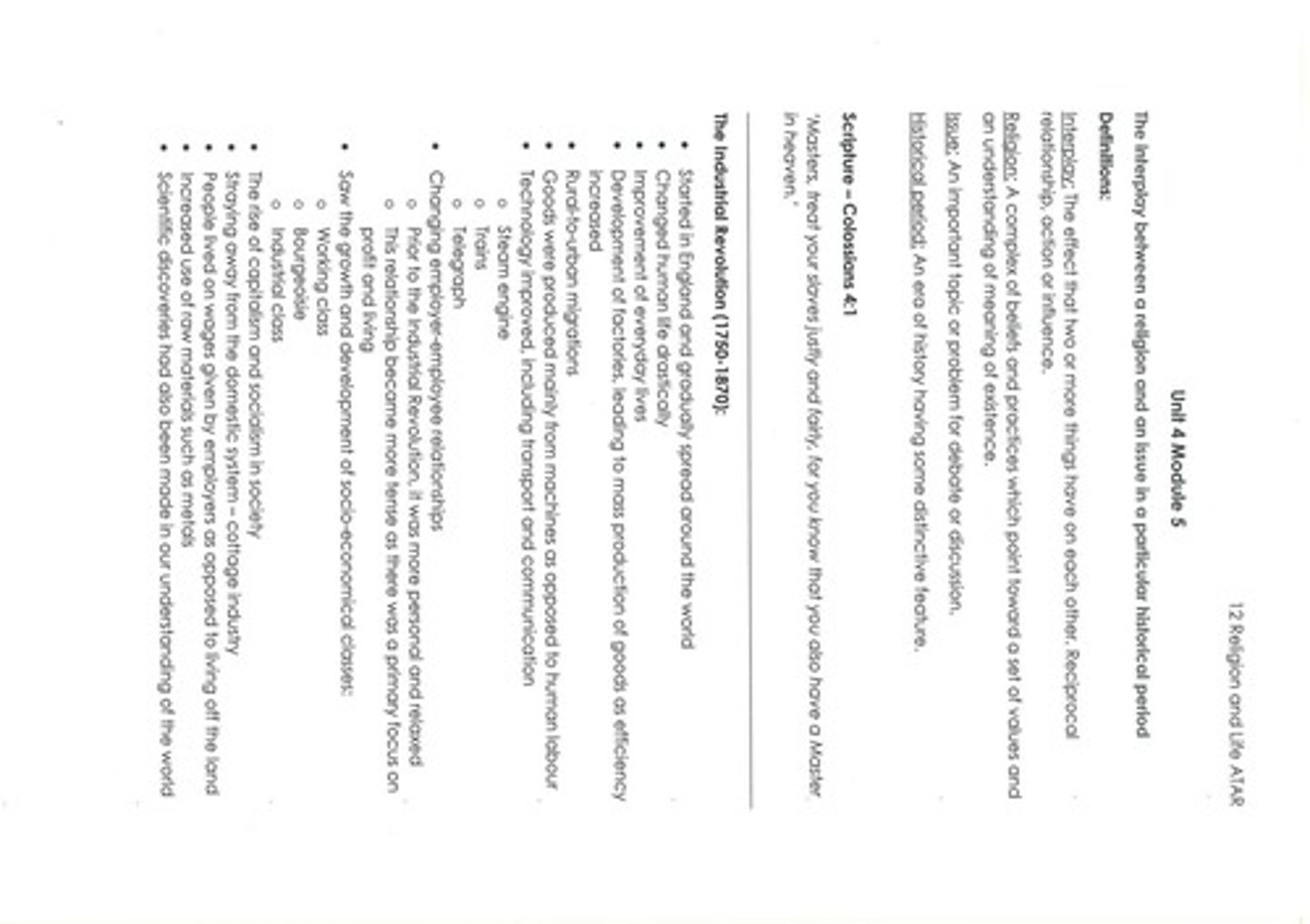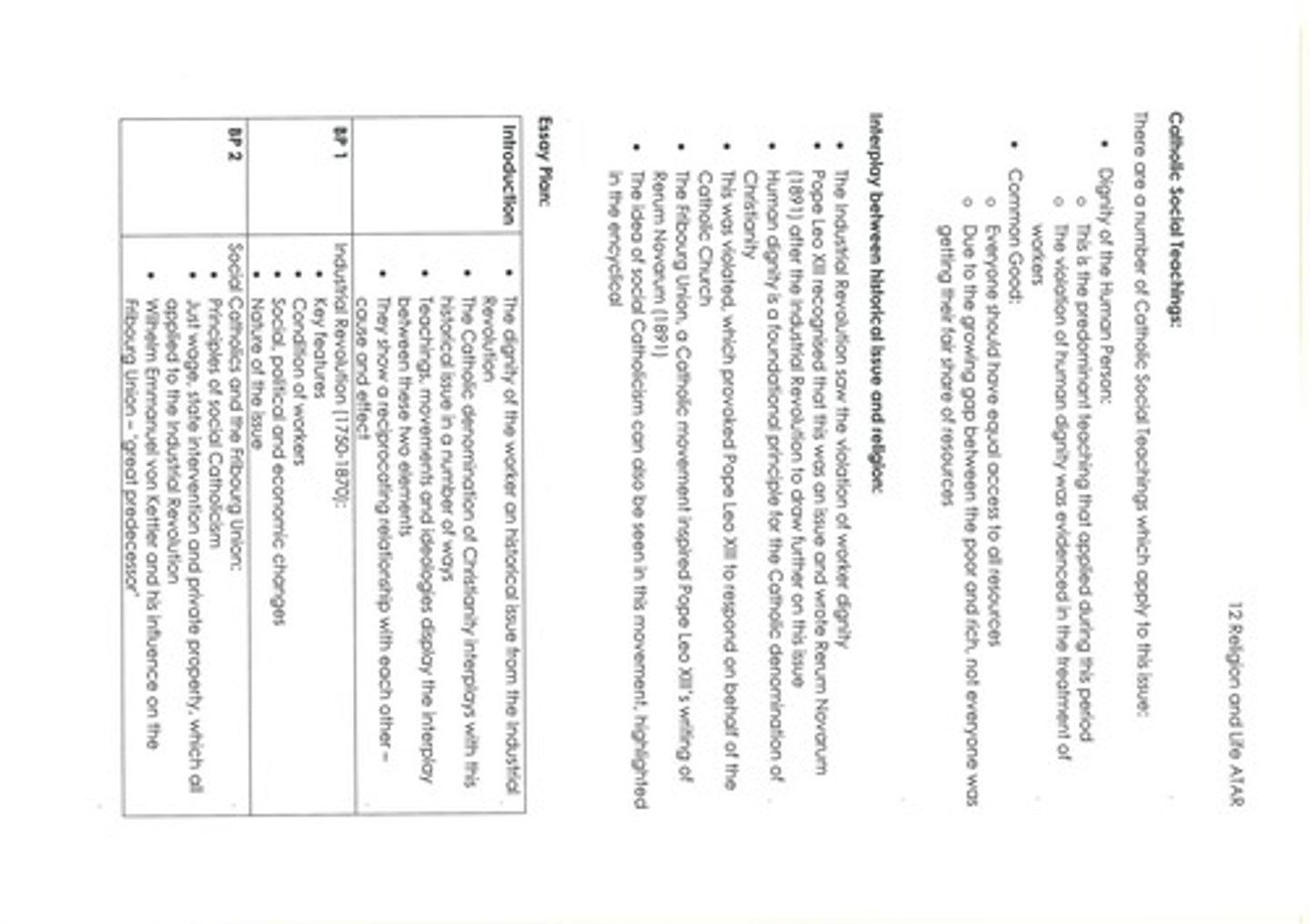Religion and the Industrial Revolution: Catholic Responses to Worker Dignity
1/44
There's no tags or description
Looks like no tags are added yet.
Name | Mastery | Learn | Test | Matching | Spaced | Call with Kai |
|---|
No analytics yet
Send a link to your students to track their progress
45 Terms
Interplay
The effect that two or more things have on each other. Reciprocal relationship, action or influence.
Religion
A complex of beliefs and practices which point toward a set of values and an understanding of meaning of existence.
Issue
An important topic or problem for debate or discussion.
Historical period
An era of history having some distinctive feature.
Industrial Revolution
A period from 1750 to 1870 that started in England and gradually spread around the world, drastically changing human life.
Rural-to-urban migrations
The movement of people from rural areas to urban areas during the Industrial Revolution.
Mass production
The production of goods in large quantities, primarily through the use of machines.
Steam engine
A key technological advancement during the Industrial Revolution that powered machinery and transportation.
Telegraph
A communication technology that improved long-distance communication during the Industrial Revolution.
Working class
A socio-economic class that emerged during the Industrial Revolution, consisting of individuals who worked in factories.
Bourgeoisie
The middle class that emerged during the Industrial Revolution, often associated with capitalist interests.
Industrial class
A socio-economic class that includes individuals involved in industrial production and management.
Capitalism
An economic system characterized by private ownership of production and the pursuit of profit.
Socialism
An economic system advocating for collective or governmental ownership of production and distribution.
Cottage industry
A system of production where goods were made at home rather than in factories, which declined during the Industrial Revolution.
Factory system
An economic system that emerged during the Industrial Revolution, where goods were produced in large factories.
Economic impact of the Industrial Revolution
Included the rise of industrial capitalism and mass production of goods.
Political impact of the Industrial Revolution
Included the growth and expansion of democracy and increased power of industrialized nations.
Social impact of the Industrial Revolution
Included increased government involvement in society and the development of cities.
Dignity of the worker
An issue that arose during the Industrial Revolution, highlighting the unfair treatment of workers.
Working conditions during the Industrial Revolution
Characterized by crowded and dirty factories, long hours, and unsafe environments.
Living conditions during the Industrial Revolution
Often overcrowded and unsanitary, with few amenities for workers.
Exploitation of workers
The manipulation and unfair treatment of workers by factory owners driven by profit.
Social Catholics
A movement within the Catholic Church addressing social issues, including workers' rights.
Just wage
A concept that work should not be seen as a commodity, with wages determined by the value of human work.
State intervention
The necessity for government action to ensure workers receive what is necessary for their subsistence.
Private property
The right of individuals to own property, emphasized in Catholic social teaching.
Fribourg Union
A German Catholic movement founded by Wilhelm Emmanuel von Ketteler, focusing on workers' rights.
Rerum Novarum
A social encyclical by Pope Leo XIII addressing capital and labor, released in 1891.
Themes of Rerum Novarum
Include the balance between capital and labor, the common good, and the role of the state.
Dignity of the Human Person
The predominant teaching that applied during this period, evidenced in the treatment of workers.
Common Good
Everyone should have equal access to all resources, highlighting the growing gap between the poor and rich.
Social Catholicism
The idea reflected in movements like the Fribourg Union, emphasizing principles such as just wage, state intervention, and private property.
Human Dignity
A foundational principle for the Catholic denomination of Christianity, emphasizing that the human person should not be exploited.
Professional Unions
Organizations representing workers, inspired by the teachings of Pope Leo XIII.
Human Person
Individuals should not be seen or used as a means to an end, as emphasized in Catholic teachings.
Relationship between Historical Issue and Religion
The interplay between the Industrial Revolution and the Catholic denomination of Christianity.

Wilhelm Emmanuel von Kettler
A key figure referred to as the 'great predecessor' influencing the Fribourg Union.
Rights of Workers
Defended by Pope Leo XIII, including the right to private property and the formation of unions.
Catholic Church's Response
Pope Leo XIII's actions and writings in response to the exploitation and suffering of workers.
Interplay of Teachings and Movements
The display of a reciprocating relationship between Catholic teachings and historical issues.

Condition of Workers
The state of laborers during the Industrial Revolution, marked by violation of dignity.
Pope Leo XIII
The Pope who recognized the issues of workers' rights and wrote Rerum Novarum.
Key Features of the Industrial Revolution
Social, political, and economic changes that affected the working class.
Catholic Social Teachings Violations
Both dignity of the human person and common good were violated, prompting a response from Pope Leo XIII.